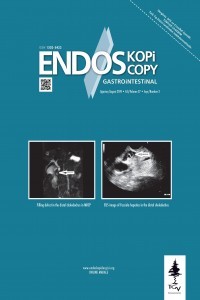İnflamatuvar bağırsak hastalığında kolonda Helikobakter pilori'nin immunohistokimyasal yöntemle araştırılması
İnflamatuvar barsak hastalığı, Helikobakter pilori
An investigation of Helicobacter pyloriinfection in patients with inflammatory bowel disease using immunohistochemistry
Colonic mucosa Helicobacter pylori, immunohistochemistry,
___
- Israel D A, Peek RM. Pathogenesis of Helicobacter pylori-induced gastric inflammation. Aliment Pharmacol Ther 2001;15:1271-90.
- Cave DR. Transmission and epidemiology of Helicobacter pylori. Am J Med 1996;100:12S-17S; discussion 17S-18S.
- Bures J, Kopacova M, Koupil I, et al. Epidemiology of Helicobacter pylo- ri infection in the Czech Republic. Helicobacter 2006;11:56-65.
- Sachs G, Weeks DL, Melchers K, Scott DR. The gastric biology of Heli- cobacter pylori. Annu Rev Physiol 2003; 65:349-69.
- Ramarao N, Meyer TF. Helicobacter pylori resists phagocytosis by mac- rophages: quantitative assessment by confocal microscopy and fluores- cence-activated cell sorting. Infect Immun 2001;69:2604-11.
- Crabtree JE. Immune and inflammatory responses to Helicobacter pylo- ri infection. Scand J Gastroenterol Suppl 1996;215:3-10.
- Pellicano R, Franceschi F, Saracco G, et al. Helicobacters and extragas- tric diseases. Helicobacter 2009;14 Suppl 1:58-68.
- Cahill RJ, Foltz CJ, Fox JG, et al. Inflammatory bowel disease: an immu- nity-mediated condition triggered by bacterial infection with Helicobac- ter hepaticus. Infect Immun 1997;65:3126-31.
- Oliveira AG, Rocha GA, Rocha AM, et al. Isolation of Helicobacter pylo- ri from the intestinal mucosa of patients with Crohn's disease. Helicobac- ter 2006;11:2-9.
- Keenan JI, Beaugie CR, Jasmann B, et al. Helicobacter species in the hu- man colon. Colorectal Dis 2010;12:48-53.
- Soylu A, Ozkara S, Alis H, et al. Immunohistochemical testing for Heli- cobacter pylori existence in neoplasms of the colon. BMC Gastroenterol 2008;8:35.
- Hansen R, Thomson JM, El-Omar EM, Hold GL. The role of infection in the aetiology of inflammatory bowel disease. J Gastroenterol 2010;45: 266-76.
- Vaira D, Gatta L, Ricci C, Miglioli M. Review article: diagnosis of Helico- bacter pylori infection. Aliment Pharmacol Ther 200216 Suppl 1:16-23.
- Jones M, Helliwell P, Pritchard C, et al. Helicobacter pylori in colorectal neoplasms: is there an aetiological relationship? World J Surg Oncol 2007;5:51.
- Chin EY, Dangler CA, Fox JG, Schauer DB. Helicobacter hepaticus infec- tion triggers inflammatory bowel disease in T cell receptor alphabeta mutant mice. Comp Med 2000;50:586-94.
- Kullberg MC, Rothfuchs AG, Jankovic D, et al. Helicobacter hepaticus- induced colitis in interleukin-10-deficient mice: cytokine requirements for the induction and maintenance of intestinal inflammation. Infect Im- mun 2001;69:4232-41.
- Zhang L, Day A, McKenzie G, Mitchell H. Nongastric Helicobacter spe- cies detected in the intestinal tract of children. J Clin Microbiol 2006;44:2276-9.
- Oliveira AG, das Graças Pimenta Sanna M, Rocha GA, et al. Helicobac- ter species in the intestinal mucosa of patients with ulcerative colitis. J Clin Microbiol 2004;42:384-6.
- ISSN: 1302-5422
- Başlangıç: 2010
- Yayıncı: Türk Gastroenteroloji Vakfı
Üst gastrointestinal endoskopi işlemi öncesi anksiyete düzeyini etkileyen faktörler
Hakan Ünal (), Gamze Özçürümez (), Fieniz Saritafi (), Murat Korkmaz (), Haldun Selçuk ()
Hipertrigliseridemiye bağlı akut pankreatit tedavisinde plazmaferez
Gülbanu ERKAN(, Esat Kıvanç KAYA(), Fatma Betül POLAT(), Bülent DEĞERTEKİN(, Gökçe Kaan ATAÇ(), Güldane Cengiz SEVAL(), Meltem AYLI(), Ahmet ÇORAKCI(), Halil DEĞERTEKİN(
Ahmet UYANIKOĞLU(), Bayram ALTUNTAŞ(), Timuçin AYDOĞAN(), Haşim NAR(), Necati YENİCE()
Elmas KASAP, Özgür YILMAZ, Hakan YÜCEYAR
Şilöz asitle prezente olan taşlı yüzük hücreli mide kanseri
Mesut SEZİKLİ(), Züleyha Akkan ÇETİNKAYA(), Fatih GÜZELBULUT(), Hayrünnisa SEZİKLİ(), Selvinaz ÖZKARA(), Göktug ŞİRİN()
Özgür BAHADIR, Mesut SEZİKLİ, Fatih GÜZELBULUT, Züleyha Akkan ÇETİNKAYA, Selvinaz ÖZKARA
Doktorlar için bir klinik zorluk: Abdominal tüberküloz 24 olgunun derlemesi
Meltem ERGÜN, Bilge TUNÇ, Aysel ÜLKER, Nurgül ŞAŞMAZ
